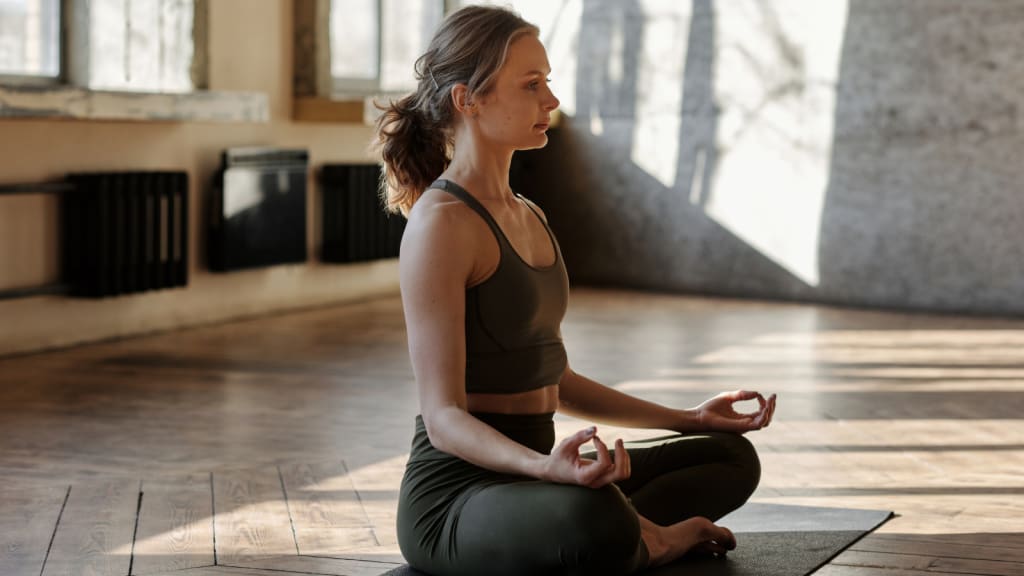
Meditation is a practice that has been used for thousands of years to promote physical and mental health. With the increasing demands of modern life, meditation has become more popular than ever as a way to Benefit of Meditation for Physical and Mental Health
Meditation is a practice that has been used for thousands of years to promote physical and mental health. With the increasing demands of modern life, meditation has become more popular than ever as a way to manage stress, increase focus and concentration, and improve overall well-being. This article will explore the benefits of meditation in detail and discuss how it can be incorporated into our daily lives.
Physical Health Benefits of Meditation
1. Lowers Blood Pressure
High blood pressure is a major risk factor for heart disease and stroke. Research has shown that meditation can help to lower blood pressure levels, which can reduce the risk of these conditions. By reducing stress and anxiety, meditation can improve circulation and decrease the production of stress hormones, which are known to raise blood pressure levels.
There are several lifestyle changes and medications that can lower blood pressure, including:
- Eating a healthy diet, low in salt and rich in fresh fruits and vegetables
- Regular physical activity and exercise
- Maintaining a healthy weight
- Reducing alcohol consumption
- Quitting smoking
- Managing stress through relaxation techniques or therapy
It’s important to consult a healthcare provider to determine the best course of treatment for high blood pressure.
2. Reduces Pain
Chronic pain is a major problem for many people and can have a negative impact on their quality of life. Meditation has been found to be an effective way to reduce chronic pain, including conditions such as arthritis, fibromyalgia, and headaches. By reducing stress and increasing relaxation, meditation can help to reduce pain sensations and improve overall well-being.
3. Improves Sleep
Sleep is essential for physical and mental health, but many people have trouble getting a good night’s sleep. Meditation has been shown to improve the quality of sleep, allowing individuals to fall asleep faster, stay asleep longer, and wake up feeling refreshed. By reducing stress and anxiety, meditation can create a calm and relaxing environment that promotes sleep.
There are several strategies that can help improve sleep, including:
- Establishing a regular sleep schedule and sticking to it
- Creating a sleep-conducive environment (cool, dark, and quiet)
- Practicing relaxation techniques such as deep breathing, meditation, or yoga before bed
- Avoiding caffeine, alcohol, and nicotine in the hours leading up to bedtime
- Exercising regularly, but avoiding intense exercise close to bedtime
- Keeping electronic devices out of the bedroom and avoiding screens for at least an hour before bedtime
- Using comfortable bedding and a supportive mattress
- Winding down before bed with a relaxing activity such as reading a book or taking a bath
It’s important to consult a healthcare provider if you have persistent sleep problems, as underlying health conditions or sleep disorders may require medical intervention.
4. Boosts Immunity
The immune system is critical for maintaining good health, but stress and anxiety can weaken the immune system. Research has shown that meditation can help to boost immunity by reducing stress and anxiety levels. By creating a calm and relaxed environment, meditation can improve the function of the immune system, making it easier to fight off infections and diseases.
There are several ways to boost immunity, including:
- Eating a balanced and nutrient-rich diet, including plenty of fruits, vegetables, and whole grains
- Getting regular physical activity
- Managing stress through techniques such as meditation, yoga, or exercise
- Getting adequate sleep each night
- Not smoking
- Limiting alcohol consumption
- Staying up-to-date with recommended vaccines
- Taking probiotics and vitamins, if recommended by a healthcare provider
- Washing your hands regularly and avoiding close contact with people who are sick
It’s important to maintain a healthy lifestyle and work with a healthcare provider to determine the best strategies for boosting immunity, as underlying health conditions or a weakened immune system may require more targeted interventions.
Mental Health Benefits of Meditation
1. Reduces Stress and Anxiety
Stress and anxiety are common problems in modern life and can have a major impact on mental health. Meditation has been shown to be an effective way to reduce stress and anxiety levels, which can improve overall well-being. By creating a calm and relaxed environment, meditation can help to regulate emotions and calm the mind, reducing feelings of stress and anxiety.
There are several ways to reduce stress and anxiety, including:
- Exercise and physical activity, such as yoga, running, or weightlifting
- Mind-body techniques such as meditation, deep breathing, and visualization
- Therapy, such as cognitive-behavioral therapy (CBT) or counseling
- Talking to someone trustworthy, such as a friend or family member
- Writing in a journal or practicing creative expressions, such as drawing or painting
- Practicing mindfulness, such as through tai chi or qigong
- Engaging in hobbies or activities that bring joy and relaxation
- Limiting caffeine, nicotine, and alcohol consumption
Getting adequate sleep each night
It’s important to consult a healthcare provider if you are struggling with persistent stress or anxiety, as they can recommend the best course of treatment, which may include medication, therapy, or a combination of both.
2. Improves Focus and Concentration
In a world filled with distractions, it can be difficult to stay focused on tasks and make decisions. Meditation has been shown to improve focus and concentration, making it easier to stay focused on tasks and make decisions. By reducing stress and anxiety, meditation can improve cognitive function and increase the ability to concentrate and focus.
There are several ways to improve focus and concentration, including:
- Exercise and physical activity can help increase blood flow to the brain
- Getting adequate sleep each night
- Eating a healthy and balanced diet, including plenty of fruits, vegetables, and whole grains
- Practicing mindfulness and meditation
- Limiting distractions, such as turning off notifications on electronic devices and avoiding multitasking
- Taking breaks to stretch, move around, or engage in a different activity
- Staying organized and breaking down tasks into manageable chunks
- Using memory aids, such as mnemonics or flashcards
- Challenging the brain through mentally stimulating activities, such as puzzles, learning a new skill, or reading
It’s important to consult a healthcare provider if you have persistent difficulties with focus and concentration, as underlying medical or neurological conditions may be contributing factors.
3. Increases Self-Awareness
Meditation can increase self-awareness and help individuals to understand their thoughts and emotions, which can lead to a greater sense of personal control and well-being. By becoming more aware of our thoughts and emotions, we can better understand the root causes of our behavior, allowing us to make positive changes and improve our overall mental health.
There are several ways to increase self-awareness, including:
- Practicing mindfulness and meditation
- Journaling and reflecting on thoughts, feelings, and experiences
- Engaging in therapy or counseling to work through personal issues and gain insight into one’s thoughts and behaviors
- Seeking feedback from trusted friends, family members, or coworkers
- Taking personality tests or assessments to better understand your strengths, weaknesses, and tendencies
- Engaging in introspection and self-reflection through activities such as solitude, nature walks, or other forms of quiet contemplation
- Practicing self-compassion and treating oneself with kindness and understanding
- Engaging in activities that promote personal growth and development, such as reading self-help books or taking workshops
- Challenging oneself by stepping outside of one’s comfort zone and trying new experiences
Increasing self-awareness is a lifelong process, and it may be helpful to work with a therapist or counselor to facilitate this growth and address any obstacles that arise along the way.
4. Boosts Mood
Regular meditation has been found to boost mood, increase feelings of happiness and reduce symptoms of depression and anxiety. By reducing stress and anxiety, meditation can create a calm and relaxed environment that promotes happiness and well-being. In addition, meditation has been shown to increase the production of feel-good hormones, such as serotonin, which can improve mood and reduce symptoms of depression.
There are several ways to boost mood, including:
- Exercise and physical activity, such as yoga, running, or weightlifting
- Spending time outdoors and getting exposure to sunlight
- Engaging in activities that bring joy and relaxation, such as hobbies or spending time with loved ones
- Practicing mindfulness and meditation
- Getting adequate sleep each night
- Eating a healthy and balanced diet, including plenty of fruits, vegetables, and whole grains
- Engaging in therapy or counseling to work through personal issues and improve mental health
- Practicing gratitude and positive thinking
- Volunteering or helping others, can increase feelings of purpose and fulfillment
- Taking care of oneself through self-care practices, such as a relaxing bath or getting a massage
It’s important to consult a healthcare provider if you are struggling with persistent low mood, as they can recommend the best course of treatment, which may include medication, therapy, or a combination of both.
How to Incorporate Meditation into Daily Life
Meditation can be practiced in many different forms, from mindfulness meditation to guided meditation. The best way to incorporate meditation into your daily life is to find a form of meditation that works for you and make it a regular part of your routine. Here are some tips for getting started with meditation
1. Set aside time
Choose a time each day when you can consistently practice meditation, whether it’s in the morning, afternoon, or evening. Set aside at least 10-15 minutes for your meditation practice.
2. Choose a quiet place
Find a quiet, comfortable place where you can sit or lie down and focus on your breathing. Avoid distractions such as noise, bright lights, or other distractions.
3. Get comfortable
Whether you choose to sit or lie down, make sure you are comfortable. You can sit on a chair, cushion, or mat, or lie down on a bed or floor.
4. Focus on your breath
Start by focusing on your breath, taking slow, deep breaths in through your nose and out through your mouth. Pay attention to the sensation of the air as it enters and leaves your body.
5. Let go of thoughts
As you meditate, you will likely find that your mind starts to wander. When this happens, simply acknowledge the thought and let it go. Focus your attention back on your breath.
6. Practice regularly
Meditation is most effective when practiced regularly. Try to meditate every day, even if it’s only for a few minutes. With time, you will find that your meditation practice becomes easier and more enjoyable.
Contents in brief, meditation offers numerous benefits for physical and mental health, including improved physical well-being, better mental health, increased focus and concentration, and reduced stress and anxiety. Whether you are looking to improve your health, reduce stress, or simply improve your quality of life, meditation is an effective and accessible practice that is worth considering.
Read more...
About the Creator
TCP Times
https://tcptimes.com






Comments
There are no comments for this story
Be the first to respond and start the conversation.